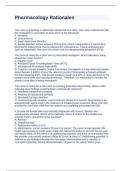-
1. Exam (elaborations) - Pharmacology test bank with 100% perfect answers 2024
-
2. Exam (elaborations) - Pharmacology test bank with 100% correct answers 2024
-
3. Exam (elaborations) - Pharmacology final test bank with correct choices 2024
-
4. Exam (elaborations) - Pharmacology test bank with 100% correct multiple choices 2024
-
5. Exam (elaborations) - Pharmacology test bank back of book with perfect answers 2024
-
6. Exam (elaborations) - Pharmacology n140 test bank questions games and activities with 100% correct choices ...
-
7. Exam (elaborations) - Pharmacology test 1 bank with 100% perfect answers
-
8. Exam (elaborations) - Question bank test #2 pharmacology with 100% correct answers 2024
-
9. Exam (elaborations) - Pharmacology test bank with correct answers 2024
-
10. Exam (elaborations) - Test#3 pharmacology test banks with perfect solutions 2024
-
11. Exam (elaborations) - Pharmacology test bank exam 3 with 100% perfect answers 2024
-
12. Exam (elaborations) - Pharmacology exam 1 test questions with perfect answers 2024
-
13. Exam (elaborations) - Pharmacology exam #3 test bank with correct choices 2024
-
14. Exam (elaborations) - Pharmacology test bank chapters 18-25 with 100% trans
-
15. Exam (elaborations) - Ati 2 pharmacology quiz bank with perfect choices 2024
-
16. Exam (elaborations) - Knowledge of pharmacology aids the dental professional in: correct answersall of the ...
-
17. Exam (elaborations) - Real hesi pharmacology exam questions with perfect answers
-
18. Exam (elaborations) - Rcis- pharmacology with perfect answers 2024
-
19. Exam (elaborations) - Pharmacology test bank with perfect answers 2024
-
20. Exam (elaborations) - Pharmacology test bank back of book with perfect answers 2024
-
21. Exam (elaborations) - Pharmacology final test bank with perfect answers 2024
-
22. Exam (elaborations) - Pharmacology n140 test bank questions with perfect answers 2024
-
23. Exam (elaborations) - Pharmacology exam #3 test bank with perfect answers 2024
-
24. Exam (elaborations) - Pharmacology test bank with correct answers 2024
-
25. Exam (elaborations) - Pharmacology test bank exam 3 with perfect answers 2024
-
26. Exam (elaborations) - Question bank test #2 pharmacology with perfect answers 2024
-
27. Exam (elaborations) - Pharmacology exam one practice questions with perfect answers 2024
-
28. Exam (elaborations) - Pharmacology test bank with perfect answers 2024
-
29. Exam (elaborations) - Pharmacology midterm test bank 1 with 100% perfect answers 2024
-
30. Exam (elaborations) - Pharmacology test 1 bank with perfect answers 2024
-
31. Exam (elaborations) - Pharmacology exam 1 test questions with perfect answers 2024
-
32. Exam (elaborations) - Test#3 pharmacology test banks with correct answers 2024
-
33. Exam (elaborations) - Pharmacology test bank chapters 18-25 with perfect answers 2024
-
34. Exam (elaborations) - Pharmacology test bank ch. 32 with perfect answers 2024
-
35. Exam (elaborations) - Pharmacology rationales exam with perfect answers 2024
-
36. Exam (elaborations) - Pharmacology rationales exam with correct answers 2024
-
37. Exam (elaborations) - Unit 7 (pharmacology) exam with perfect answers 2024
-
38. Exam (elaborations) - Pharmacology exam with perfect answers 2024
-
39. Exam (elaborations) - Pharmacology ch. 35 (adams) exam with correct answers 2024
-
40. Exam (elaborations) - Pharmacology exam with 100% correct answers 2024
-
41. Exam (elaborations) - Pharmacology ~ exam with 100% correct answers 2024
-
42. Exam (elaborations) - Pharmacology exam with correct answers 2024
-
43. Exam (elaborations) - Pharmacology exam with correct answers 2024
-
44. Exam (elaborations) - Pharmacology exam with perfect answers 2024
-
45. Exam (elaborations) - Pharmacology exam with correct answers 2024
-
46. Exam (elaborations) - Pharmacology 1 final exam with correct answers 2024
-
47. Exam (elaborations) - Pharmacology test exam with correct answers 2024
-
48. Exam (elaborations) - Pharmacology ch 7-11 exam with 100% correct answers 2024
-
49. Exam (elaborations) - Pharmacology exam with correct answers 2024
-
50. Exam (elaborations) - Pharmacology mid year exam with correct answers 2024
-
51. Exam (elaborations) - Pharmacology exam with correct answers 2024
-
52. Exam (elaborations) - Pharmacology exam with 100% correct answers 2024
-
53. Exam (elaborations) - Clinical pharmacology exam with correct answers 2024
-
54. Exam (elaborations) - Rationales pharmacology exam with 100% correct answers 2024
-
55. Exam (elaborations) - Pharmacology exam 1 (module 1 and 2) with correct answers 2024
-
56. Exam (elaborations) - Pharmacology exam with correct answers 2024
-
57. Exam (elaborations) - Pharmacology exam with correct answers 2024
-
58. Exam (elaborations) - Pharmacology exam with correct answers 2024
-
59. Exam (elaborations) - Pharmacology exam with 100% correct answers 2024
-
60. Exam (elaborations) - Pharmacology exam 3 with perfect answers 2024
-
61. Exam (elaborations) - Pharmacology questions exam 1 spring 2024 with correct answers
-
62. Exam (elaborations) - Pharmacology exam with correct answers 2024
-
63. Exam (elaborations) - Pharmacology exam with correct answers 2024
-
64. Exam (elaborations) - Pharmacology quiz 1 (module 1 & 2) exam with 100% correct answers 2024
-
65. Exam (elaborations) - Pharmacology module 1 exam with correct answers 2024
-
66. Exam (elaborations) - Pharmacology final exam with correct answers 2024
-
67. Exam (elaborations) - Pharmacology git questions exam with correct answers 2024
-
68. Exam (elaborations) - Psychiatric technician pharmacology board exam with corrrect answers 2024
-
69. Exam (elaborations) - Pharmacology exam with 100% correct answers 2024
-
Show more




